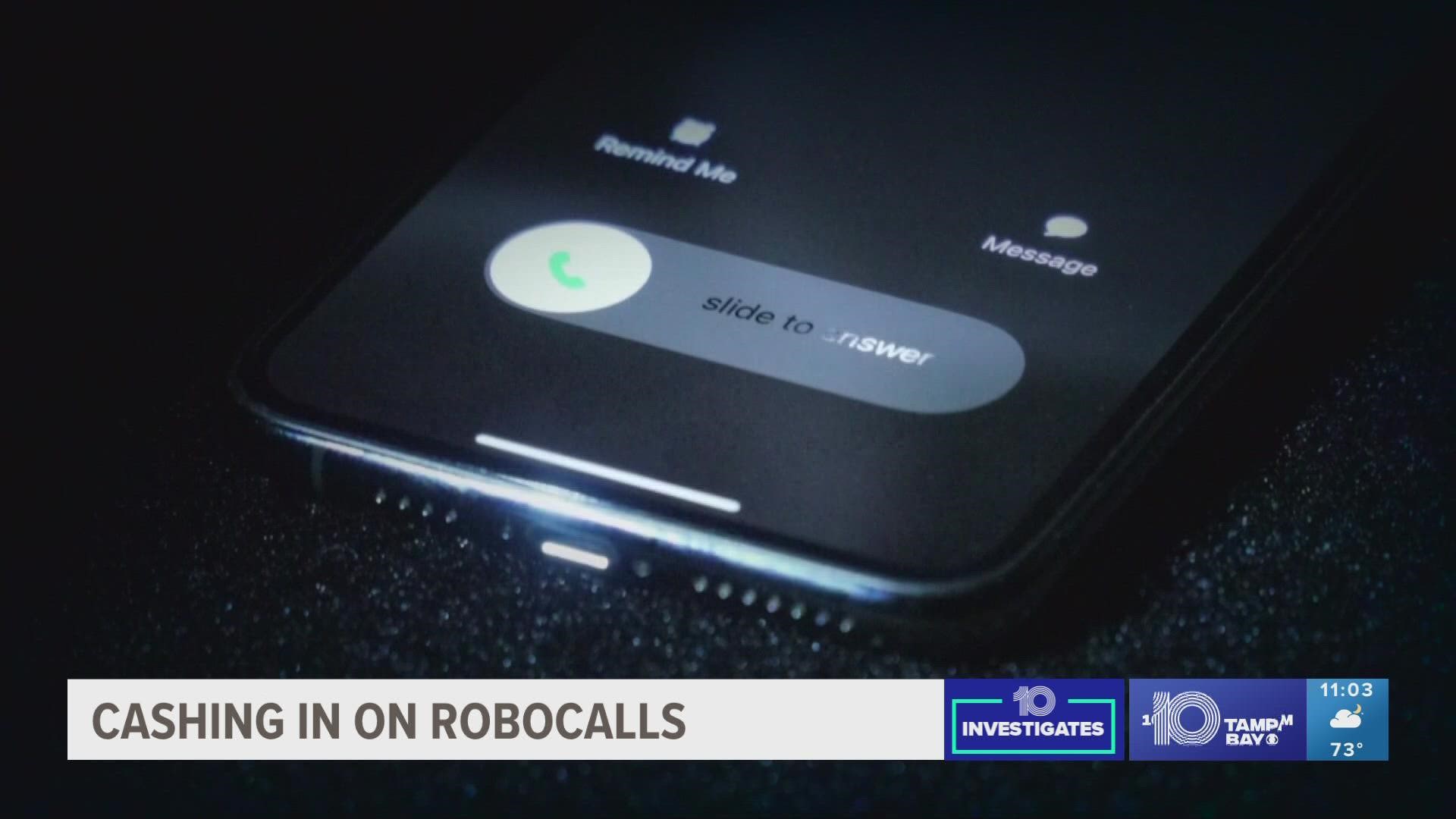ST. PETERSBURG, Fla. — In a matter of three seconds, 6,000 robocalls have been dialed nationwide. Data from the voicemail app YouMail shows that robocalls are up across the country this past month —158.2 million per day.
As astonishing as you might find those numbers, you could be making thousands of dollars just by fighting back on these calls.
Last year, we introduced you to Adam Ward. In one year, he made more than $20,000 fighting against the calls.
“I wanted to make them rethink it,” Ward told 10 Investigates. One year later, the fight hasn’t stopped. “I don’t know exact math off [the] top of my head,” Ward added. “It’s right around $60,000.”
Ward says the payoff is worth the amount of time it takes to do a little homework.
“I will say it takes a little bit of diligence,” he said, adding, “you gotta be willing to do some online research and really kind of dig in.”
Here’s how Ward is able to cash in on the calls.
What you need to cash in
The Telephone Consumer Protection Act of 1991 (TCPA) allows penalties each time a company violates the National Do Not Call Registry and uses automatic dialing systems or pre-recorded messages in an illegal manner.
The federal government uses the law to target harassing telemarketers in rare cases, but more importantly, the TCPA allows citizens to file lawsuits against telemarketers who may make tens of thousands of automated calls on any given day.
“My phone rings ten times a day from telemarketers,” Ward said.
This is where Doc Compton comes in — he came up with the idea and the "turning robocalls into cash" kit.
If you go to the website robocalls.cash, you can get the kit for $47, which includes samples of the demand letters you send to the companies calling you, letting them know that they are breaking the law.
"Essentially, you have to take the call, you have to talk to the caller, get them to give you a little bit of information. The types of information that you're going to try and get out of the caller varies depending on the types of calls that you're getting, who it is that's calling, when they're calling and so on," Compton explained in an earlier interview.
"From there, use the template demand letters that we provide in the kit, it's basically fill in the blank, send it off. And believe it or not, these guys want to negotiate, they don't want to go to court."
Ward said, "You have to act interested in the product. It's trying to collect as much information as you can while you're playing along."
Fighting against robocalls while cashing in
So what has Ward done with the cash?
“I bought a nice new TV. That's probably the biggest thing I splurge[d] [on]," Ward said. “The biggest one I settled on [was] for $20,000 even. That’s my biggest one to date.”
He says that’s nice, but now, he’s on a mission to fight back. On the day we talked with Ward, he had nine robocalls.
“One call — legitimately — [I talked] to my dad,” Ward said.
The rest were all robocalls. He says companies are targeting a certain group.
“90% of them that I'm getting now, it's Medicare and it's like, I'm far from being retired," he added. “That’s one of the big things though with these companies they definitely prey on elderly people.”
Says Florida Attorney General Ashley Moody, “That's why I'm always pushing folks to report these calls. They seem like a nuisance. We don't want to do anything about them but be part of the solution and report them.”
She announced last month that her office has teamed up with states across the nation to investigate companies that help facilitate robocalls.
“You hear lawmakers talk about it, but it continues happening,” Ward said.
Which is all the reason he says to continue to fight back.
“Big picture not sure how much it's helping but personally if you want to get fewer calls you can pursue these people if you put in time a few hours is all it takes,” he added.
How to get on 'Do Not Call' list
The big thing to remember is to make sure you have registered your number on the national "Do Not Call" list. You can do that by going to donotcall.gov or by calling 888-382-1222.
Ward says that if a company calls him after being on that list, it’s $1,500 per call. You can also report robocalls to the Florida Attorney General's Office.

